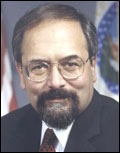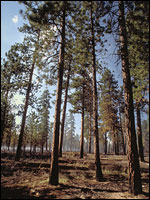
Mark Rey.
Photo: USFS.
According to lawyers from Defenders of Wildlife, Agriculture Undersecretary Mark Rey, who oversees the U.S. Forest Service, seems to be pulling some moves out of the Dick Cheney playbook — the very same tricks of evasion and secrecy that have jeopardized the vice president’s reputation in the fiasco surrounding his energy task force.
Rey and his department have been dragging their feet in response to requests for public release of documents regarding the Bush administration’s proposed overhaul of forest-management practices. Critics suspect the documents might confirm that logging-industry executives wielded undue influence over the process.
The current tussle began in October 2002, when Defenders of Wildlife and the Endangered Species Coalition slapped the USDA with a Freedom of Information Act lawsuit. They wanted documentation of the Bush administration’s motivation for suspending Clinton-era rule updates under the National Forest Management Act, which governs America’s nearly 200 million acres of national forest — parcels of land that make up 8 percent of the country. NFMA was passed in 1976 and implemented under the Reagan administration to better manage national forests and protect wildlife.
“Bush’s NFMA overhaul is the biggest-ever rewrite of our nation’s forest management policies,” said Defenders President Rodger Schlickeisen. “These regulations govern every decision that is made about every acre of national forest, and the Bush reforms cater precisely and blatantly to requests that have been made for years by the logging industry.” Schlickeisen says the rewritten policies diminish public and scientific input in the planning process, gut many key wildlife protections, and allow increased logging on public land.

Tree at last, tree at last.
Photo: USFS.
“They reverse even the protections that were put in place by the Reagan administration, including basic [National Environmental Policy Act] reviews and biodiversity standards,” he added. “These are hardly far-left, eco-liberal kinds of protections if they seemed logical to Reaganites!”
According to Rey, the NFMA rules released by Clinton in 2000 were not technically suspended, but simply put into legal limbo. As he explained to Muckraker, “We don’t think these 2000 rules are implementable. We know that everybody hates them, so we told [forest managers] that for now [they] can either have the option of using the 2000 revisions or using the 1982 rules” until the Bush administration comes up with something it considers better.
Rey was quick to point out that some groups within the environmental community vigorously objected to the Clinton-era revisions when they came out in 2000 on the grounds that they “were an unjustified weakening of [Reagan’s] 1982 rules.” It seems contradictory for them to object to further rewrites, he said.
But Mike Leahy, a senior attorney at Defenders of Wildlife, argues that Rey is missing the point: “Our lawsuit was in no way a defense of the Clinton administration’s rules. It’s an investigation into the motives behind Bush’s suspension and proposed revisions — which are a wholesale dismantling of the Forest Service’s planning regulations relative to both the 2000 and the 1982 regs.”
Defenders was further irked when Rey’s office seemed to come down with a case of selective amnesia: Rey told the U.S. District Court for the District of Columbia that it had no records whatsoever — no transcripts, memos, emails, or calendar records — documenting meetings between the agency and industry groups (or anyone else, for that matter) during the process of revising the forest policies.
Granted, Rey is well-versed in the timber industry’s concerns, having spent nearly 20 years working for various timber trade associations before joining the Bush administration, so there’s an argument to be made that he didn’t even need to meet with industry groups to craft their dream policies. Still, the USDA’s no-evidence claim seemed as indefensible to the court as to the plaintiffs who requested the documents.
The court agreed with the plaintiffs that “the defendants [did] not meet their burden of conducting a reasonable search and justifying non-disclosure of exempted information.” The court told Rey, in effect, to keep trying — it requested that his office do a further search for information and give a more reasonable explanation for why certain documents should be withheld.
“We’re going to comply with the court order,” Rey told Muckraker, but he insisted that “there’s no need to reach beyond that to broader theories of bad faith and conspiracy because the court didn’t find them and they don’t exist.”
That’s not enough to convince Defenders of Wildlife.
In early March, Rey told the Senate Energy and Natural Resources Committee that substantial “modifications” to the proposal for revamping the Clinton-era rules are in the works, and the final draft is likely to be released in the next several months.
“They’re probably consulting lawyers to try and make themselves least vulnerable to legal challenge,” said Schlickeisen. “Because clearly if these new modifications are anything like what we’ve seen, they’re illegal. And we’ve made it clear that we’ll do what’s necessary to prove it.”


